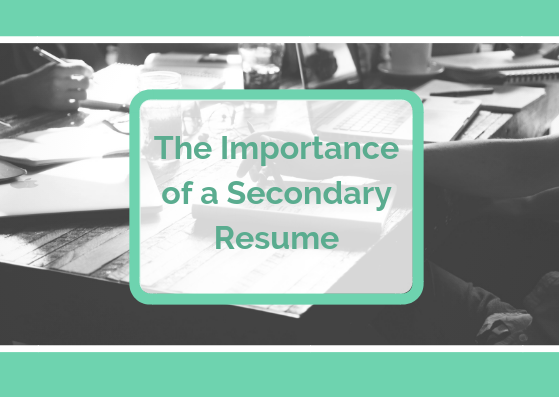Last month I wrote about How to Manage a Career Change with Confidence. As a follow up, let’s take a look at the importance of Secondary Resumes, and how having multiple resumes can benefit you as a job seeker, or even a happily employed professional.
Using multiple resumes has become a common practice amongst a variety of professionals. With the prevalence of technology used throughout the hiring process and the increasing importance of targeted resumes and relevant keywords, having multiple resumes allows the candidate to more effectively target their pursuits.
It also opens up more options than if they were confined to only one resume. With two resumes, each can be more directly targeted toward it’s intended audience.
When it makes sense to have multiple resumes
Having multiple resumes allows the job seeker to pursue multiple different career directions, which gives them more options and opportunities for success in a career transition.
Depending on the types of positions you plan to target and how different they are, it may even be beneficial (or necessary) to have more than 2 resumes. There was a time in my career when I had 3 different resumes because I wasn’t sure if I wanted to stay in college-level Career Services, try to move into recruiting, or change course complete and pursue jobs as an Executive Administrative Assistant. (This was shortly before an unexpected layoff pushed me into self-employment, or what I like to affectionately call ‘accidental entrepreneurship’…but I digress.)
For professionals just considering a career transition and weighing their options, creating a secondary resume can serve as a great exercise in learning exactly how strong their skills are in a particular area. If they can go through the entire process and come up with enough compelling content to fill an effective resume, then chances are they’ve got a reasonable shot at successfully making the transition into that are of interest. If not, well…maybe not.
Even professionals who aren’t in a career transition can benefit from having multiple versions of their resume at-the-ready. For example, a 5th-year professional in technology, engineering, sales, etc. has likely developed specific expertise and/or skills in multiple areas. Any one of these areas could present an unexpected opportunity at any time, which would make it incredibly advantageous to already have a relevant resume available – not just a general resume, but one that is tailored to emphasize their strengths and skills as they relate to that specific area.
Do the resumes have to be completely different?
Unless you’re targeting drastically different career fields or job types, chances are there will be some overlap and similarities between the various versions of your resume. The important thing to keep in mind is relevance. Think of your intended audience and focus on what is relevant to them.
For career transition-ers to do this effectively, it often means thinking of your career history and job functions in a whole new way and analyzing the similarities between your current/post jobs and the new ones you’ll be pursuing.
They’ll need to emphasize transferrable skills by (1) identifying skills used in previous positions that can prove valuable in the new target positions, then (2) rewriting resume job descriptions to clearly demonstrate how those skills relate and add value.
This also requires some outside-the-box thinking and is probably one of the most difficult aspects of writing a transitional resume versus other, straight-line career path resumes. But it is a key part of the process.
Don’t be afraid to ask for help.
I offer free resume consultations which will provide you with targeted resume feedback with suggested improvements and job search insights to help you move forward successfully. (Don’t’ worry – there’s absolutely no obligation, and many professionals find the tips and feedback helpful even without engaging my services.)
Changing careers can feel intimidating, confusing, and sometimes overwhelming. But I promise they’re not as complex as they seem. Once you dial-in your focus on understanding your audience, how best to target them, and how to effectively implement your efforts to meet their needs, it all starts to fall into place.
Want more career-related goodness?
- Get a powerful 5-Step Resume Action Plan that will help you transform your resume into an interview-getting machine.
- Download my 54 Super Impressive Resume Action Verbs list by joining the Career Courage Facebook group.
- Find more DIY career resources here.
- Apply now for a free strategy call if you’re thinking about 1:1 services with a career expert.
